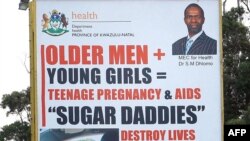A new study shows that alleviating poverty can help protect South African teenage girls from HIV/AIDS. It says small, monthly government grants allow girls to live more normal lives and avoid the advances of older men. The older men are called sugar daddies. They’ve got cash and use it to lure poor girls into having sex with them.
“Throughout sub-Saharan Africa teenage girls face a huge risk, which is poverty. And many of them really struggle to pay for basic things in their families, like food. So, about 25 percent of the children in our sample don’t have enough to eat in their families for at least two days in the past week,” said Dr. Lucie Cluver, associate professor at Oxford University and the University of Cape Town and the lead author of the study.
But Cluver said going hungry is just one of the problems they face.
“One of the biggest reasons that girls talk about having older boyfriends – or having transactional sex or sugar daddies – is because they need to pay school fees and they need to provide food for their family. And that’s especially bad when someone is ill in their family. So if they’re living with a grandmother who’s old and very frail or if they’re living with someone who’s very sick with HIV/AIDS or something else, then it’s even harder because they have to support that person.”
Boys do not face the same burden.
Cluver said, “Really it’s about the market. It’s a buyers and a sellers market. What you do get is older men who have access to cash, who are looking for younger girlfriends. You just don’t seem to see the sugar mommy syndrome, where you would have an older woman and a younger boy. You just don’t seem to see it.”
Some people may have the wrong impression about why teenage girls have sugar daddies or older boyfriends.
“A lot of what people have talked about when they talk about transactional sex and sugar daddies has been seeing teenage girls as choosing to have these older boyfriends because they give them nice toiletries and hair stuff and cellphones and luxuries. So they’ve seen it as something that these girls have been choosing to do because they’re aspirational – because they’re trying to, you know, look like Beyoncé,” she said.
The average age of the more than 3,500 South African girls interviewed for the study is 14.
Cluver said the South African government has expanded an older grant program. It now provides child support grants of about $35 a month to 11 million children under age 18.
“In a sub-Saharan African country, we have a government grant system that provides for every child who is poor and who needs the money. When I started working as a social worker in the early 2000s, that grant system was originally designed for white families under Apartheid. And they moved it to cover all families who are in need, so, including the huge populations of black and colored families in South Africa,” she said.
The South African government also provides foster child grants of $96 a month to about 600,000 people. But Cluver said many needy children are still not yet covered by the program.
In Malawi and Tanzania, studies show that grants or cash transfers can have a positive effect. For example, in Malawi, cash transfers to girls resulted in a lower HIV prevalence rate. A big reason is that girls start dating boys their own age, who are less likely than older men to be infected with the AIDS virus.
But the grant system is not perfect. The study says grants do not reduce other kinds of risks for girls, such as the likelihood of having unprotected sex or having sex while drunk. And the grant system does not reduce the HIV risk for boys.
“Throughout sub-Saharan Africa teenage girls face a huge risk, which is poverty. And many of them really struggle to pay for basic things in their families, like food. So, about 25 percent of the children in our sample don’t have enough to eat in their families for at least two days in the past week,” said Dr. Lucie Cluver, associate professor at Oxford University and the University of Cape Town and the lead author of the study.
But Cluver said going hungry is just one of the problems they face.
“One of the biggest reasons that girls talk about having older boyfriends – or having transactional sex or sugar daddies – is because they need to pay school fees and they need to provide food for their family. And that’s especially bad when someone is ill in their family. So if they’re living with a grandmother who’s old and very frail or if they’re living with someone who’s very sick with HIV/AIDS or something else, then it’s even harder because they have to support that person.”
Boys do not face the same burden.
Cluver said, “Really it’s about the market. It’s a buyers and a sellers market. What you do get is older men who have access to cash, who are looking for younger girlfriends. You just don’t seem to see the sugar mommy syndrome, where you would have an older woman and a younger boy. You just don’t seem to see it.”
Some people may have the wrong impression about why teenage girls have sugar daddies or older boyfriends.
“A lot of what people have talked about when they talk about transactional sex and sugar daddies has been seeing teenage girls as choosing to have these older boyfriends because they give them nice toiletries and hair stuff and cellphones and luxuries. So they’ve seen it as something that these girls have been choosing to do because they’re aspirational – because they’re trying to, you know, look like Beyoncé,” she said.
The average age of the more than 3,500 South African girls interviewed for the study is 14.
Cluver said the South African government has expanded an older grant program. It now provides child support grants of about $35 a month to 11 million children under age 18.
“In a sub-Saharan African country, we have a government grant system that provides for every child who is poor and who needs the money. When I started working as a social worker in the early 2000s, that grant system was originally designed for white families under Apartheid. And they moved it to cover all families who are in need, so, including the huge populations of black and colored families in South Africa,” she said.
The South African government also provides foster child grants of $96 a month to about 600,000 people. But Cluver said many needy children are still not yet covered by the program.
In Malawi and Tanzania, studies show that grants or cash transfers can have a positive effect. For example, in Malawi, cash transfers to girls resulted in a lower HIV prevalence rate. A big reason is that girls start dating boys their own age, who are less likely than older men to be infected with the AIDS virus.
But the grant system is not perfect. The study says grants do not reduce other kinds of risks for girls, such as the likelihood of having unprotected sex or having sex while drunk. And the grant system does not reduce the HIV risk for boys.






